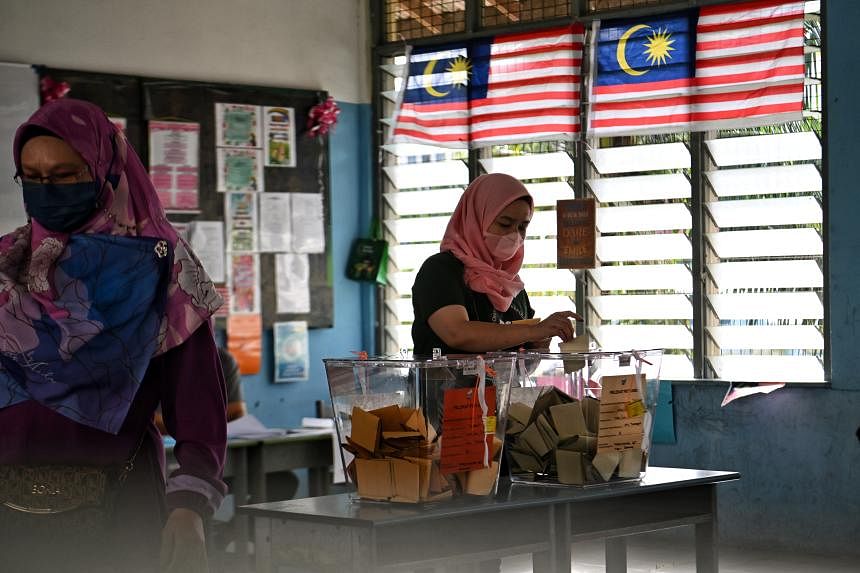KUALA LUMPUR - Early results of the closest race in Malaysia’s election history have started trickling in, as three key coalitions and scores of smaller parties vie to form the fifth government in as many years.
About 70 per cent of the country’s 21 million voters - some braving heavy rain and floods - had cast their ballots as at 4pm on Saturday.
The total voter turnout in the 2018 general election was 82 per cent, and 84 per cent in 2013.
A record 945 candidates were nominated to run for the 222 parliamentary seats. However, only 220 parliamentary seats completed balloting on Saturday. Voting was suspended in the rural ward of Baram, Sarawak, due to bad weather and floods. Meanwhile, the election in Padang Serai, Kedah, has been postponed to Dec 7 after its incumbent MP and Pakatan Harapan candidate Karupaiya Mutusami died on Wednesday.
Although pollsters on Friday predicted that opposition leader Anwar Ibrahim’s Pakatan Harapan (PH) was likely to win the most seats but fall short of a simple majority, they also warned that dozens of constituencies remained too close to call.
The Straits Times looks at the likely outcomes of Saturday’s vote and what scenarios may unfold as a result.
Scenario 1: Hung Parliament with BN as the largest bloc
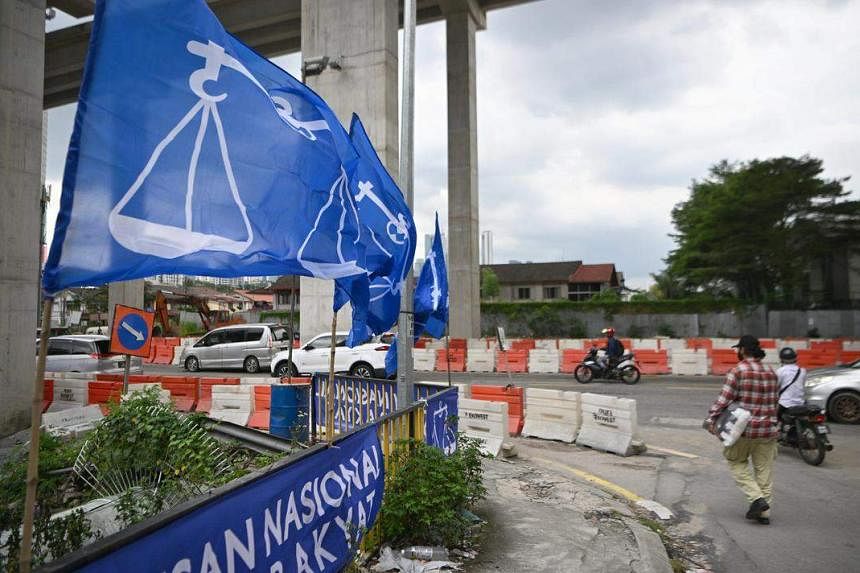
If this base case scenario coming into the campaign materialises, BN is expected to form a government with Gabungan Parti Sarawak (GPS), an alliance of former BN parties which dominate the Borneo state. GPS is projected to win between 25 and 30 seats.
What is less clear-cut is whether BN will follow through on its promise that Umno vice-president Ismail, its prime minister candidate, will resume leading the country. Umno president Zahid Hamidi is seen as a possible contender for the post, after he took centre stage during BN’s campaign to decide its candidate line-up – which saw Datuk Seri Ismail’s allies dropped – and present its manifesto.
Much will depend on which other parties will join BN to get it past the simple majority of 112 seats, and whether they are willing to back Zahid, a leader facing dozens of graft charges.
Scenario 2: Hung Parliament with PH as the largest bloc
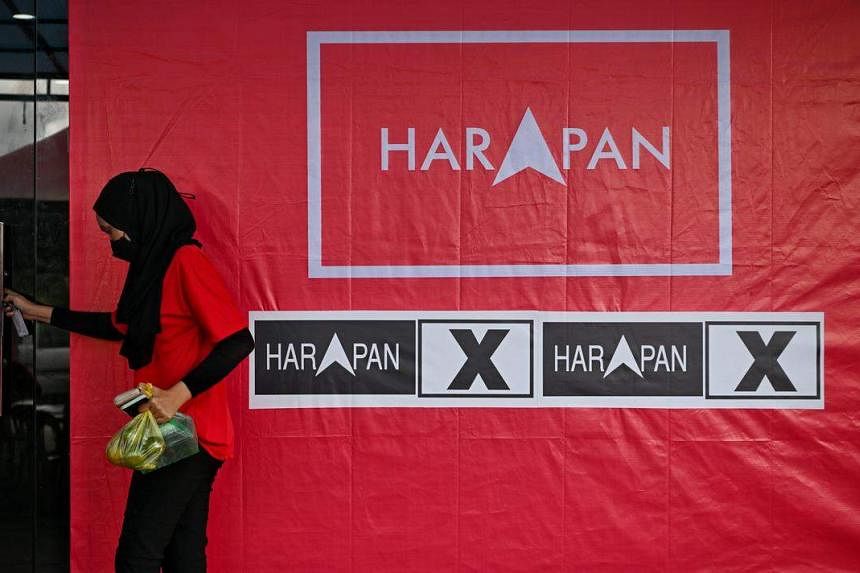
The most recent survey across the first week of the campaign indicates that PH’s popularity has surged far ahead of its rivals’. Several studies predict that PH will breach the 90-seat mark, or even reach three-digit territory.
Ordinarily, this would put Datuk Seri Anwar in pole position to fulfil his 25-year quest to ascend to the nation’s highest office. But the parties he will have to team up with to gain a simple majority may think otherwise.
Their red line is the PH component, the Democratic Action Party (DAP), which has been accused by bumiputera (a term used to denote the Malay majority and aboriginal natives) nationalist parties of being pro-Chinese and wanting to undermine their special privileges and Islamic interests. They also claim that Mr Anwar is either a co-conspirator or DAP’s cat’s paw.
Thus, PH might find itself back where it started – having the largest bloc of MPs but still in the opposition.
An “everyone but PH” government is a likely outcome, with either Mr Ismail or PN chief Muhyiddin – whose popularity among Malays has surged during the campaign – as prime minister.
Scenario 3: BN wins simple majority

BN securing 112 seats on its own steam is looking like a far-fetched idea, based on polling data. The Straits Times has learnt that even internal projections from BN’s war room are nowhere near that figure.
Nonetheless, a combination of freak events could still throw up such a result. This includes floods preventing opposition supporters from turning up to vote, overseas postal ballots not returning in time, and outstation voters not being able to make the trip back to their constituencies. Or the fence sitters may decide to vote for BN en bloc.
If this happens, Zahid is more likely to become prime minister, as BN would no longer need support from outside parties who might protest against his leadership.
Scenario 4: PH wins simple majority
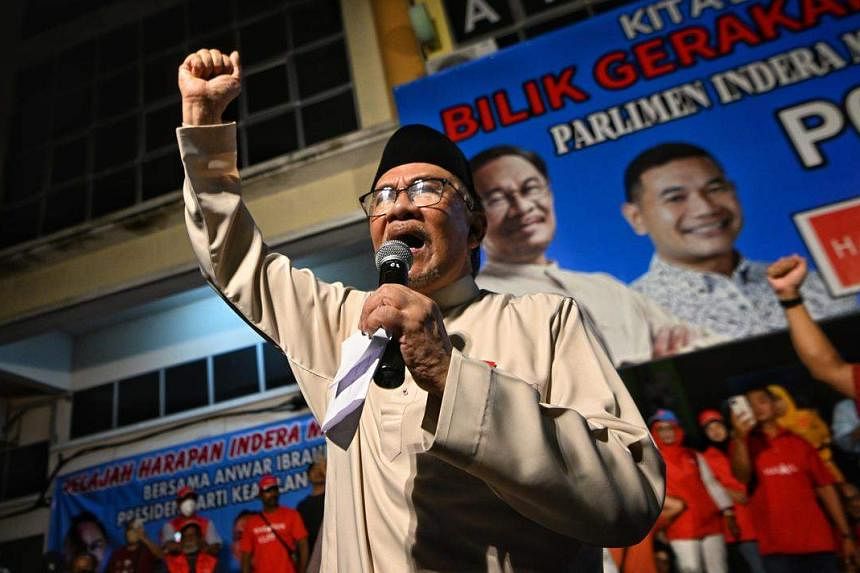
PH’s whirlwind tours across the country headlined by Parti Keadilan Rakyat’s (PKR) top duo, Mr Anwar and Mr Rafizi Ramli, have roused the electorate, but the jury is still out on whether they can win PH a strong mandate.
The challenge for PH will be whether it can increase its support among sceptical Malay Muslims. BN’s campaign appears to have stabilised this week after an initial negative response.
Should Mr Anwar have the backing of 112 PH lawmakers, the King would be able to swear him in as prime minister of what would probably be the most stable government of these scenarios.
Scenario 5: Anwar and Zahid team up
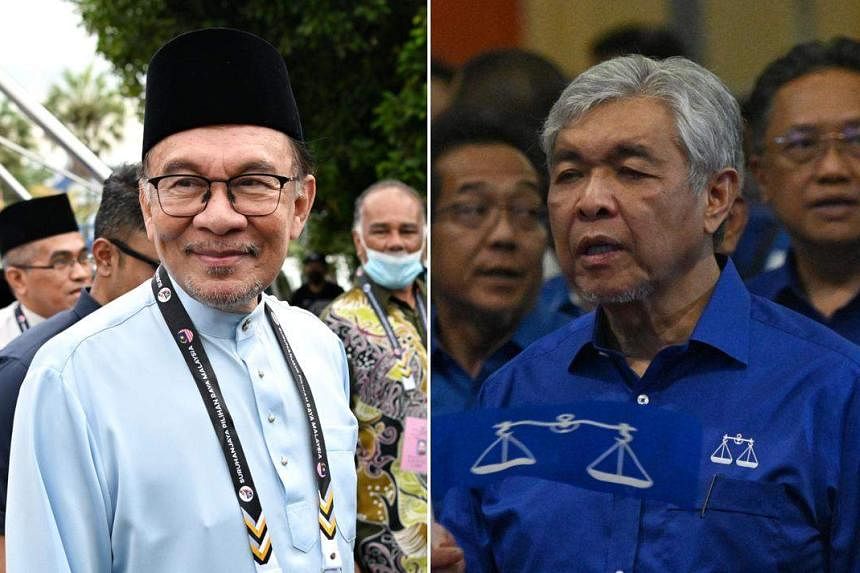
Such talk had been swirling before Tun Dr Mahathir Mohamad openly claimed that Zahid would back Mr Anwar – his former mentor – for PM if he is absolved of corruption charges and Umno’s former premier Najib Razak is freed from prison.
Others like Tan Sri Muhyiddin and his PN ally, Parti Islam SeMalaysia president Hadi Awang, have made similar accusations. But there is little to suggest that it is anything more than political rhetoric designed to sow doubt among PH and BN supporters.
A BN-PH government is extremely unlikely, given that large segments of both coalitions consider the other side to be their arch-enemy. PKR deputy president Rafizi, whose allies won the lion’s share of positions at party polls in 2022, has said he would be the first to oppose such a deal.
Get the latest news and results for Malaysia GE at https://str.sg/malaysia-election
